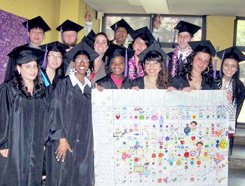Preparing Students for STEM Careers
As summer winds down and we prepare for a new school year, I would like to share a letter one of our veteran math teachers, Stephanie Lundin, sent to the summer staff at Envision Schools. Stephanie received her BA and MA from UC Davis. She has taught math for seven years, four at Envision Schools. Coaching students through the Envision Schools Graduation Portfolio Defense has been her most meaningful teaching experience.
Here are excerpts from Stephanie's letter:

Welcome back to the school year! While all of you have been traveling the world and enjoying the sun, I got an IISME Fellowship for the summer and worked in a cube with artificial lighting. (I'm not bitter at all.) IISME is an organization that places teachers in STEM (Science, Technology, Engineering and Mathematics) industry jobs for the summer where they get real world industry experience to bring back to the classroom. I've been working at a software company called Synopsys formatting and creating help documents for the IT department. I'm writing this to share with you what I learned at a STEM panel discussion at our mid-summer meeting and how it relates to what we're doing at Envision.
In this discussion, six professionals from various fields (IBM, Intel, Synopsys, Stanford, Varian Medical Systems) talked about their experiences of getting into their fields; what skills they use in their fields, what that implies for education, and what skills and abilities they would love students to come out of high school having mastered.
What was profound to me as I was taking notes is that I kept writing down words and ideas that have become deeply engrained in my vocabulary and teaching practice in the four years I've been with Envision. I walked away from that panel with the feeling that we're doing a lot of stuff right, which made me happy and excited to start this school year.
Some highlights:
- Four out of 6 panel members said that a class, teacher, or field trip caused them to become interested in STEM careers.
- One talked about his physics class and how the teacher got him into the topic with demonstrations and really cool labs.
- Another cited a field trip to the local hurricane lab in her Florida hometown where they launched 2x4's across the room to study hurricanes.
- Another talked about his math and science teachers in high school and how they were much more interesting and engaging about their material than his humanities teacher (no judgment to humanities teachers).
Skills needed in STEM careers:
- ability to make connections between arithmetic, algebraic and geometric thinking
- solving the same problem in multiple ways
- the ability to think, create, logic, problem solve, collaborate (also know as leadership skills)
- a sound technical foundation (referring to skills in math that kids find boring, but are critical for simple reasoning in life -- fractions, percents, decimals, scientific notation, etc.)
- understanding of both STEM Literacy and STEM Fluency (sounds like the two science tasks, literacy and inquiry, if you ask me)
- collaboration and human interaction
- creativity and innovation
- ability to memorize
The purpose of education is:
- to inspire students to follow their dreams
- to establish the foundation for future study
- to be held accountable for actions
- to build commitment
- to learn the ability to learn from mistakes and persevere
- to develop expertise (or at least a desire and foundation for it)
My favorite quote by Chelsea Simmons, a PhD student at Stanford: "More of the work comes AFTER the answer. You have to prove to others why your answer is right so you have to research and analyze your results." (Um, Envision Schools Portfolio Defense, anyone?)
My second favorite quote comes from Julie Dunkle, from Intel: "Every child should have the chance to be an expert at something. It's more about expertise than about the PhD."
What did you do this summer to deepen your learning to be a better teacher? How do you prepare students for STEM careers? Please share with us!